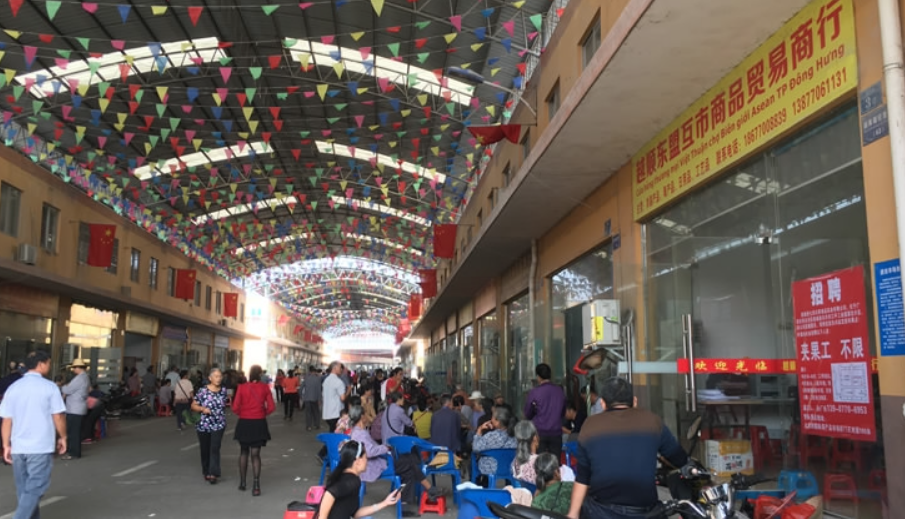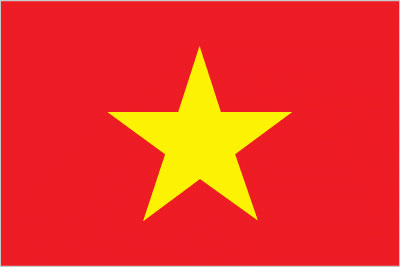
THE EXPERIENCE OF THAILAND AND CHINA ON STATE MANAGEMENT FOR “BORDER MARKETPLACES”
23:13 - 12/12/2022
Dau Hai Nam
Master of Science - Government Office of Vietnam
Border marketplaces play a significant role in promoting the purchase, sale and exchange of goods between two neigbour countries, contributing to the development of international trade as well as to socio-economic development and poverty reduction in border and remote areas. Every country has its own policy and measures to to ensure the stability and development of border marketplaces. Their experience, namely Thailand and China, could be a valuable lesson for Vietnam state management of Vietnam, border market place.
Keywords: Market place; Border trade; China.
1. Experience of Thailand
Thailand has a land border of 4,863 km with its neighboring countries including Malaysia, Myanmar and Cambodia. Along Thailand's border with neighboring countries, there are more than 100 border marketplaces operating to serve import-export business, trading and exchanging goods across the border.
Infrastructure and facilities in border marketplaces of Thailand are invested and built for permanent use. The business activities and operations of each of these border marketplaces are closely linked with the operation of a corresponding border gate with Malaysia, Myanmar, Laos and Cambodia. At border marketplaces with the bordering countries, Thailand allows the establishment of "free trade zones". Goods traded here are exempt from duties and eligible for reduced fees and related charges. Border marketplaces have their own geographical boundaries, and specialized management forces like customs, immigration and quarantine etc., are assigned to function in these border marketplaces.
Thailand's border marketplaces are governed by regulations that are independent of those governing domestic marketplaces. Business conditions at border marketplaces are more flexible, allowing Thai businesses and residents as well as businesses and residents of the bordering countries or third countries to rent shops at the border marketplaces. Tourists or buyers as well as means of transport can easily enter border marketplaces from within Thailand or from other countries through the border gates with Thailand. Thailand has a support strategy for "Made in Thailand" goods traded at border marketplaces, and a policy to reduce import/export duties and other related fees and charges for shops doing import-export, or trading and exchanging Thai goods. Therefore, at most border marketplaces, 80-90% of goods are Thailand’s products. Goods originating from a bordering country and from a third country usually account for a very small proportion of the ones traded at border marketplaces in Thailand.
Regarding payment, Thailand sets up bank branches or transaction offices at most of the border marketplaces to serve for bank payments or money exchange. At border marketplaces, the Baht is the only currency that is accepted for cash payment. However, there are many currency exchange counters at all border marketplaces and most currencies in the world, including freely convertible and other foreign currencies, can be quickly and conveniently converted to Baht.
Management activities at a border marketplace are carried out by a Market Management Board. The Market Management Board performs the function of managing construction investment, repair and maintenance, and at the same time organizes the activities of the border marketplace. The Border Market Management Board is also responsible for maintaining security, order and safety for tourists, residents and traders doing business or visiting, shopping at the market. In addition, the Management Board has the right to collect fees for renting shops, warehouses, transportation terminals, parking and other services. All revenues at border marketplaces are left to the Market Management Board for investment and development and other activities.
- Experience of China
The border trade policy is the basis for the Chinese state to manage border trade in general and activities at border marketplaces in particular. Policies and regulations on management of border marketplaces in China are currently published by two levels, including central and local policies and regulations.
Border market management activities are regulated in the Foreign Trade Law of the People's Republic of China, dated April 6, 2004, in which Article 68 stipulates: “The State adopts flexible measures, and provides preferential treatment and convenience to trade between the border areas of China and those of its neighboring countries as well as trade among border residents. The specific measures in this regard shall be formulated by the State Council”. Most of China’s policies and regulations on management of border marketplaces are published by the State Council based on assessment of the development of border marketplaces. The Ministry of Commerce of China shall assume the prime responsibility for, together with relevant ministries and sectors, to publish policies applied nationwide on relevant sectors such as Customs, Goods Inspection, Immigration, Foreign Exchange, and on the basis of relevant regulations of the State Council, publish regulations in their respective fields, work out synchronous management measures. The policies and measures on the management of China's border marketplaces include: Policy on management of small-scale border trade and external economic and technical cooperation in border areas; Policy on management of trade between a pair of border marketplaces; Policies to promote economic and trade development in border areas; Policies and measures to manage test of imported goods at the border; Measures to manage foreign exchange related to border trade; Measures to manage specialized funds for border areas.
In addition, China has supportive policies related to the development of border marketplaces such as the state's ethnic policy and regional development policy. At the same time, the authorities of border provinces and autonomous regions, on the basis of policies and regulations published by the national level, have promulgated and published policies and regulations more suitable to the situation of the local border trade development.
China clearly stipulates that a "border market" or a “pair of border marketplaces" is considered as one of border trade forms. Trade at border marketplaces refers border residents’ exchange of goods value and volume of which does not exceed the prescribed thresholds on the value and quantity of traded goods at the marketplace located at the border openings or at one location within 20 km from the border line as designated by the government. Entities operating at border marketplaces (zones) include border trading enterprises and individuals. Small-scale border trade enterprises refer to enterprises approved by the China’s trade authority to conduct border trade.
Regarding management of import and export activities implemented at border marketplaces: small-scale border trade enterprises are exempted from applying for quotas and permits for designated trading goods, but still subject to macro management of the Ministry of Commerce and the State Planning Commission (now called the National Development and Reform Commission). Collection of import duties on goods imported by an external economic-technical cooperation enterprise in a border area in the form of economic cooperation with a partner in a border area of a neighboring country shall be implemented in accordance with the import tax collection policy applicable to border marketplaces.
The current preferential policies for border marketplaces are mainly expressed in the form of allocation of specialized fund, taxes, customs management, foreign exchange management, inspection and quarantine of goods. The most important form of preferential policy is the allocation of specialized fund. Specifically, preferential policies:
(1) Regarding specialized fund: the allocation of specialized fund started from November 1st, 2008 replacing the preferential policy of collecting only half of import and export duties levied on goods traded at border marketplaces applied during the period 1996 – 2008. The scale of these specialized funds has been increased over years, only used for financing the development of border trade activities at border marketplaces and capacity building for border trade enterprises operating at border marketplaces.
(2) Regarding tax incentives: regulation on exemption from import duties and value added tax levied on goods imported within a certain threshold in the form of border market trade. This threshold has been increased from RMB 100 in 1985 to RMB 8,000 in 2008. The policy is both applicable to normal trade and to border trade at border marketplaces. Specifically, since 1999, China has applied a policy to offset interest of loans taken for export activities in the form of border trade to generate foreign currency revenue or a policy to support the payment of initial costs of projects on foreign economic and technical cooperation. This is a form of the encouragement of the Chinese Government for the implementation of foreign economic and technical cooperation, in order to implement the "going-out" strategy, to support investment in the resource projects abroad, and to take advantage of the exploitation of natural resources abroad.
(3) Other management aspects: Simplify customs management procedures applicable to border market trade; Export tax refund for border trade activities with payment made in RMB.
(4) China's border market trade policy also defines the regulatory agencies and their responsibilities for border trade. In which, the Ministry of Commerce and the General Department of Customs unanimously promulgate regulations on management of trade activities at border marketplaces while the authorities of border provinces are responsible for the organization of the implementation of such regulations.
3. Some implications for Vietnam
Having learnt the experience of Thailand and China on border market management, following lessons on the state management of border marketplaces can be drawn for Vietnam to adopt:
Firstly, it is necessary to pay due attention to the development of border marketplaces, consider goods trading and exchanging activities at border marketplaces as important factors to promote economic, social, trade development and poverty alleviation in difficult border areas.
Secondly, it is necessary to issue separate regulations on the management and administration of border market activities to ensure that trade in goods across land border gates is administrated and managed according to mechanisms and policies independent of those applied to trading activities at marketplaces in the domestic market or other forms of domestic trade.
Thirdly, policies to facilitate the entry and exit of people and means of transport engaging in activities at border marketplaces, not only to create favorable conditions for border traders and residents to engage in business activities at border marketplaces, but also to encourage tourists to buy goods at border marketplaces should be adopted.
Fourthly, there should be a separate policy on goods traded and exchanged at border marketplaces, on the one hand, to encourage the import of goods from the bordering countries for domestic production and consumption, on the other hand, to encourage the production of goods that can be exported to the bordering countries' market or to serve tourists’ shopping needs.
Fifthly, a mechanism to encourage and create favorable conditions for business entities doing business at border marketplaces who shall be eligible for exempt reduction of relevant taxes, fees and charges should be adopted.
Sixthly, the regulation on payment currency at border marketplaces is more flexible than the one applicable to international and domestic trade. The local currency of either of the bordering countries or freely convertible currency are accepted at border marketplaces. Payment can be made through branches or transaction offices of banks and credit institutions, or it can be made in cash.
Seventhly, it is necessary to simplify health quarantine, sanitary and phytosanitary procedures, goods quality inspection, food hygiene and safety control at border marketplaces; only tighten inspection and control when there is a notice of a threat to a particular goods item.
Last but not least, the Market Management Board ensures convenient environment for competent authorities to efficiently perform their inspection and control of functions and favorable conditions for organizations and individuals to travel, work and do businesses within border marketplaces; organizes the collection of taxes, fees and related charges to ensure the operation of border marketplaces./.
REFERENCES
- Ministry of Industry and Trade (2018), Report on "Development planning of Vietnam - China border markets to 2025, vision to 2030", Hanoi;
- Ministry of Industry and Trade (2017), Project "Strengthening the search and attraction of investment capital sources for the construction of Vietnam-China border markets", Hanoi;
- Ministry of Industry and Trade (2007), Decision No. 12/2007/QD-BCT dated December 26, 2007 approving “Master plan on development of market network nationwide up to 2010 and orientation towards the year 2020. 2020”, Hanoi;
- Prime Minister (2016), “Decision No. 2534/QD-TTg dated December 28, 2016 of the Prime Minister promulgating the Plan for Implementation of the Border Trade Agreement between the Government of the Socialist Republic of Vietnam and the Socialist Republic of Vietnam. Vietnameseism and the Government of the People's Republic of China”, Hanoi;
- Prime Minister (2015), “Decision No. 52/2015/QD-TTg dated October 20, 2015 of the Prime Minister promulgating the management of border trade activities with bordering countries”, Hanoi;
- Kristof Dascher and Alexander Haupt (2011), The political economy of regional integration projects at borders where poor and rich meet: The role of cross-border shopping and community sorting, Journal of Urban Economics, Volume 69, Issue 1, January 2011.





